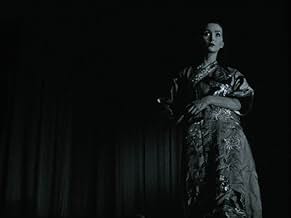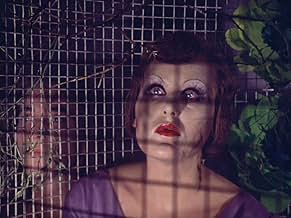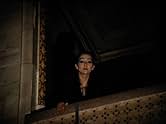IMDb RATING
6.4/10
424
YOUR RATING
This is about the life and myths about famous opera singer Maria Malibran (1808-1836). She died on the stage.This is about the life and myths about famous opera singer Maria Malibran (1808-1836). She died on the stage.This is about the life and myths about famous opera singer Maria Malibran (1808-1836). She died on the stage.
- Director
- Writer
- Stars
- Director
- Writer
- All cast & crew
- Production, box office & more at IMDbPro
Featured reviews
Words can easily break, since the relation between form and meaning is arbitrary. Moreover, a word that does not hit its object, is superfluous. Language as a whole is misused by daily gossip and the boulevard press. Since a long time, the problem to recognize the forest starting from the individual trees has become obsolete. Our problem has become now not to overlook the trees when we believe to recognize the forest. However, since it is basically enough to associate any form with a certain meaning, language can become a master of its own. The dadaists had shown that sense and meaning are creeping back into language by the back-door, after they have been thrown out by the main entrance. Schroeter systematically combines more or less senseless speeches to unfitting persons. Also purposely, their moving of the mouth does not correspond to the words we hear - and not even to the texts that they sing. Compared to language, music has at least one dimension more: the melody. Like the sounds of the words, so the parts of the melody endow speech with sense, but with their own sense, and this new sense may be our last hope after we have recognized that our everyday language has lost its proper sense. Like the words, their sounds, detached from their meanings, float along as water does, so the characters are not strongly differentiated anymore. They seem to be individuals, but they share their identities, they participate in one another in an eternal exchange.
10sleepsev
`The Death of Maria Malibran' is a very strange film. After I have seen this movie twice, I still know very little about Maria Malibran. Everything that happens in this film is beyond my understanding. When I walked out of the cinema, I felt like waking up from a dream. I remember the dream quite clearly, but I don't understand what happens in it, and why it happens like that. All I know is that this is the most enjoyable dream I have ever had in my whole life.
Though I never like opera, I still love this film very much. Though I don't understand what is the plot or the story behind this film, it captivates me entirely. The photography, the art direction, the lighting, and the make-up are of excellent quality. The acting, the editing, and the music are exceptional too. I like it very much that the camera often focuses on the expression on characters' faces. This technique both heighten the beauty of the image, and make it look very funny at the same time. I also like the movement and the positions of characters in each frame very much.
However, `The Death of Maria Malibran' is not just a very strange film. It is not just a film full of beautiful images and beautiful soundtracks. It is not just an experimental film. It means much more than that to me. Many images in this film touch me so strongly that I can't imagine how I can adequately express how much I like it. More importantly, I was completely surprised and overwhelmed with joy to find that many images in this film are somehow like what my friends and I have been fantasizing for a long time. Werner Schroeter is the first guy that I know who can make our fantasy come true.
`The Death of Maria Malibran' really expands the boundary of cinematic empire in my viewing experience. I have never known nor imagined one can make a movie like this. But now that I know a film like this really exists, my hope and my faith in the potential of cinema are restored, and I will go to see a movie with much more excitement and eagerness than before. Cinema can prove itself to me again that it is really unpredictable.
Though I never like opera, I still love this film very much. Though I don't understand what is the plot or the story behind this film, it captivates me entirely. The photography, the art direction, the lighting, and the make-up are of excellent quality. The acting, the editing, and the music are exceptional too. I like it very much that the camera often focuses on the expression on characters' faces. This technique both heighten the beauty of the image, and make it look very funny at the same time. I also like the movement and the positions of characters in each frame very much.
However, `The Death of Maria Malibran' is not just a very strange film. It is not just a film full of beautiful images and beautiful soundtracks. It is not just an experimental film. It means much more than that to me. Many images in this film touch me so strongly that I can't imagine how I can adequately express how much I like it. More importantly, I was completely surprised and overwhelmed with joy to find that many images in this film are somehow like what my friends and I have been fantasizing for a long time. Werner Schroeter is the first guy that I know who can make our fantasy come true.
`The Death of Maria Malibran' really expands the boundary of cinematic empire in my viewing experience. I have never known nor imagined one can make a movie like this. But now that I know a film like this really exists, my hope and my faith in the potential of cinema are restored, and I will go to see a movie with much more excitement and eagerness than before. Cinema can prove itself to me again that it is really unpredictable.
How on earth does one attempt to describe a movie like this? First, a caveat or two: do not go to this film expecting any sort of plot, or even coherent narrative; do not expect any information about Maria Malibran's life, or even her death, for that matter (she died of complications from a horseback riding accident--one could never guess this from the film); do not expect any sense of what it is to be a singer, or any sense of opera as an art form; do not even expect to have any clear idea which face on the screen is supposed to be Maria Malibran.
Obviously, this film was an utter, confused mystery to me. A few arresting images (and a bunch of commonplace and pointless ones) are all well and good, but one needs some sort of structure (even the suggestion of a guideline would have been welcome) to hang them on in order for them to have any real power. I'll do my best to describe the opening 15 minutes or so of the film as I remember it (it's been almost 15 years.....it's stayed with me this long, so it must have had something to it, but god knows what)......there are two female heads, from about the shoulders up, in the frame leaning in from either side toward each other at odd angles. The faces are made up with powder (complete with a beauty mark or two) and both appear to be wearing 18th-cent.-style wigs, suggesting stage costuming (or court dress) of some kind. In the background, a muted, scratchy recording of a chunk of the first movement of Beethoven's Triple Concerto is playing (which goes back to some point part-way-through the movement several times, in case you didn't hear it the first time, presumably--and this not any sort of logical edit we're talking about). There is no dialogue, no movement (perhaps the heads do, VERY slowly, lean imperceptibly toward each other...it's difficult to know for sure). This goes on for 15 minutes or so. That's it. The effect would be mind-numbing if it weren't so annoying. It then shifts to something else completely, and someone finally says something, but one is so busy trying to figure out what Schroeter could have possibly meant to convey by that impossibly long opening exercise that it's difficult settle into any sort of "groove" with it. Nothing is explained, almost nothing is suggested, and what is suggested is done so with no frame of reference, making the "suggestions" ultimately meaningless.
Perhaps the key is to experience this film "as a dream". I, for one, do not experience art that way (and this film certainly has pretensions to "art"!), and would suggest that if it has nothing more to offer than a bunch of dream-like images and sequences with no apparent connection, subtext, or or even frame of reference, then it's not art in the first place. Which leaves the question, "What is it?"
Obviously, this film was an utter, confused mystery to me. A few arresting images (and a bunch of commonplace and pointless ones) are all well and good, but one needs some sort of structure (even the suggestion of a guideline would have been welcome) to hang them on in order for them to have any real power. I'll do my best to describe the opening 15 minutes or so of the film as I remember it (it's been almost 15 years.....it's stayed with me this long, so it must have had something to it, but god knows what)......there are two female heads, from about the shoulders up, in the frame leaning in from either side toward each other at odd angles. The faces are made up with powder (complete with a beauty mark or two) and both appear to be wearing 18th-cent.-style wigs, suggesting stage costuming (or court dress) of some kind. In the background, a muted, scratchy recording of a chunk of the first movement of Beethoven's Triple Concerto is playing (which goes back to some point part-way-through the movement several times, in case you didn't hear it the first time, presumably--and this not any sort of logical edit we're talking about). There is no dialogue, no movement (perhaps the heads do, VERY slowly, lean imperceptibly toward each other...it's difficult to know for sure). This goes on for 15 minutes or so. That's it. The effect would be mind-numbing if it weren't so annoying. It then shifts to something else completely, and someone finally says something, but one is so busy trying to figure out what Schroeter could have possibly meant to convey by that impossibly long opening exercise that it's difficult settle into any sort of "groove" with it. Nothing is explained, almost nothing is suggested, and what is suggested is done so with no frame of reference, making the "suggestions" ultimately meaningless.
Perhaps the key is to experience this film "as a dream". I, for one, do not experience art that way (and this film certainly has pretensions to "art"!), and would suggest that if it has nothing more to offer than a bunch of dream-like images and sequences with no apparent connection, subtext, or or even frame of reference, then it's not art in the first place. Which leaves the question, "What is it?"
Did you know
- TriviaAllegra Curtis's debut.
- ConnectionsFeatured in Beautiful Darling (2010)
Details
- Release date
- Country of origin
- Language
- Also known as
- The Death of Maria Malibran
- Production company
- See more company credits at IMDbPro
Contribute to this page
Suggest an edit or add missing content

Top Gap
By what name was La mort de Maria Malibran (1972) officially released in Canada in English?
Answer























